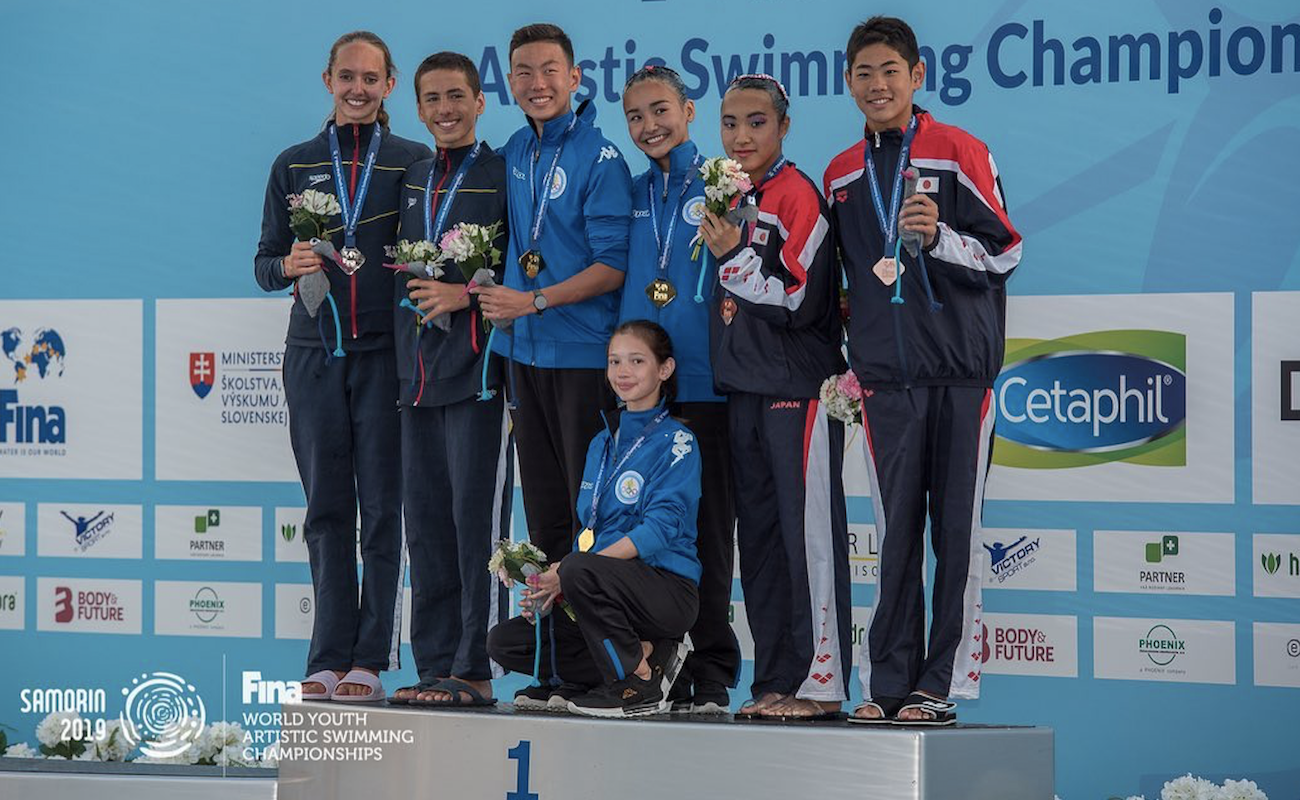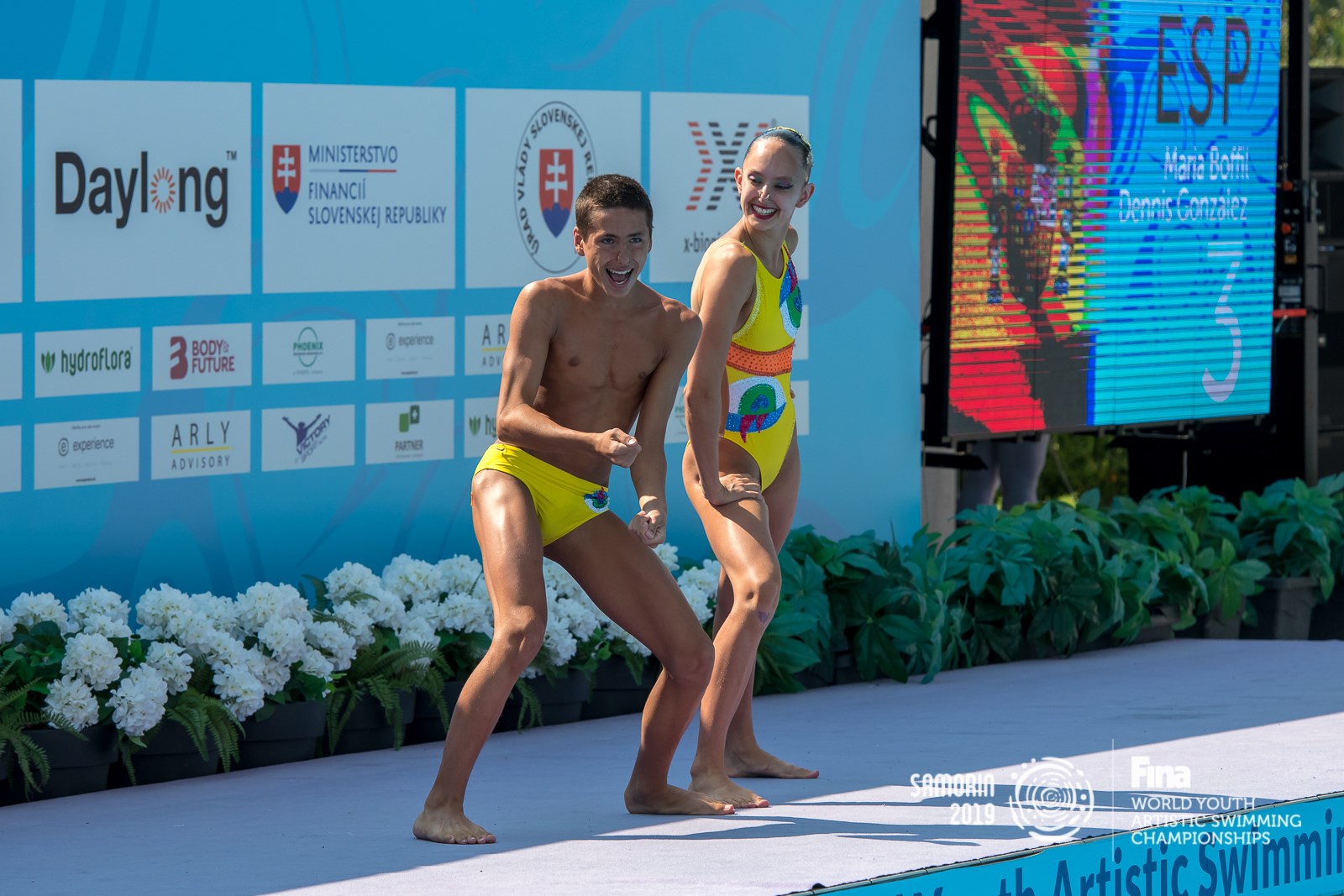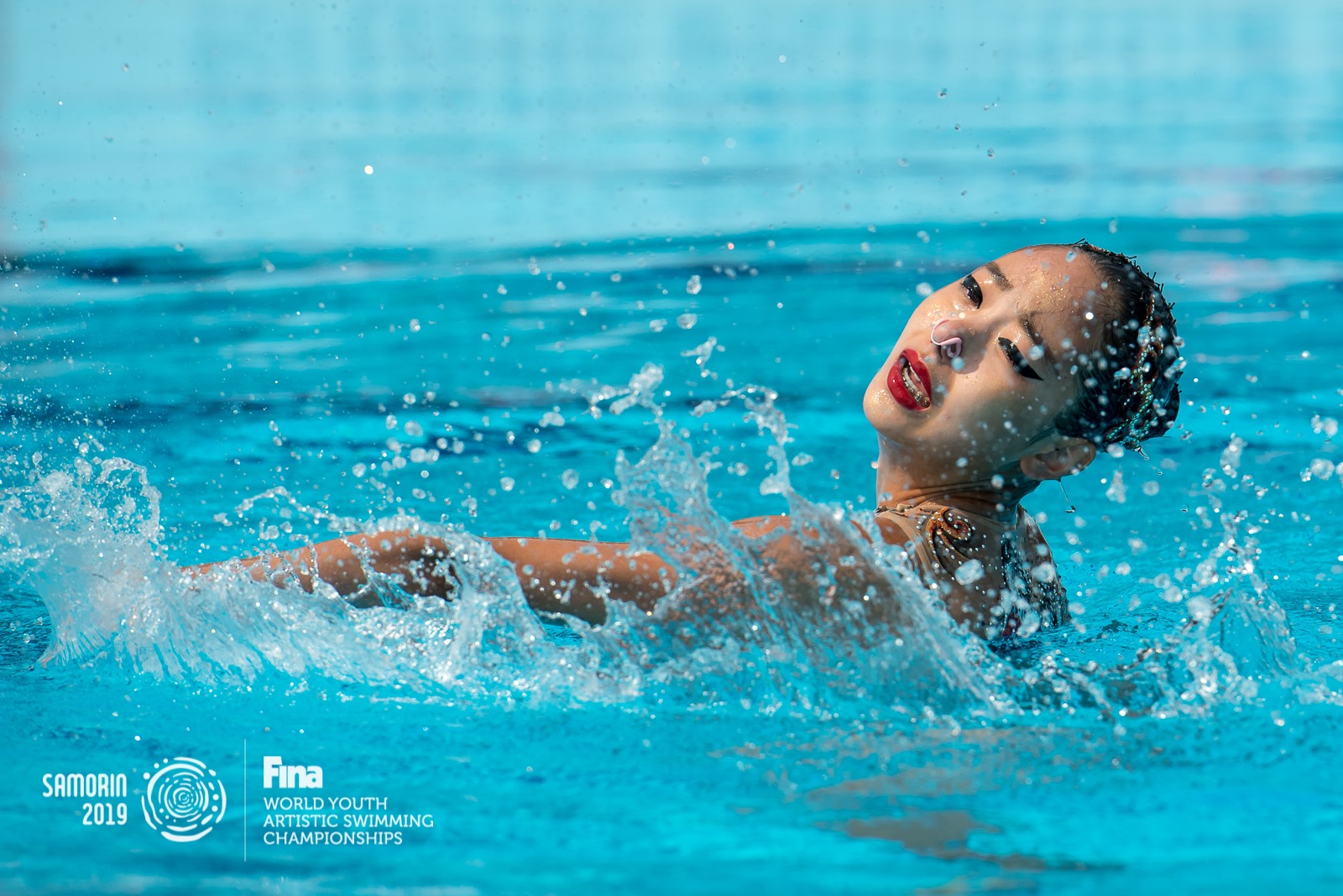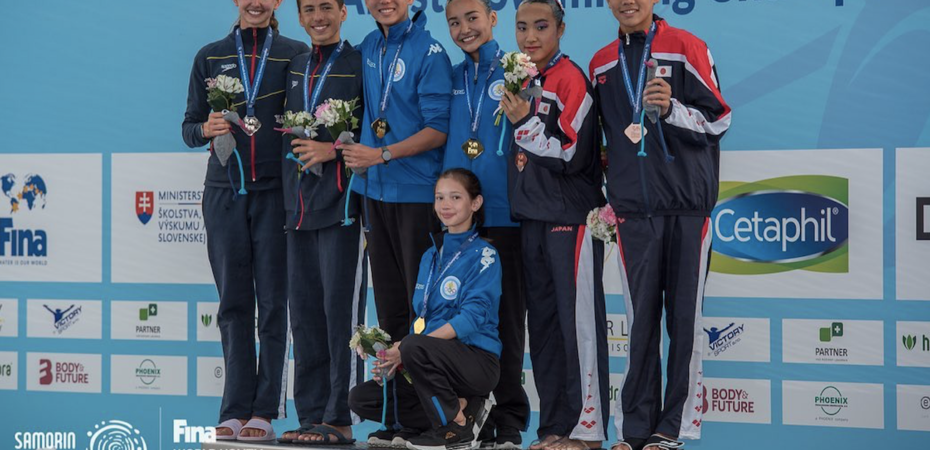The very first edition of the FINA Youth World Championships, held in Samorin, Slovakia, saw Russia and Kazakhstan get a share of the six gold medals that were up for grabs. While the Russians won every single event they were entered in and left Slovakia with five world titles (solo, duet, team, combo and figures), the Kazakhs made history by winning the mixed duet event.

2019 marked the first time that mixed duets were included in major international competitions in the 13-15 category, starting with the COMEN Cup in early August to now the FINA Youth World Championships. While we had already seen the pairs from Kazakhstan, Spain and Italy a few weeks ago at the COMEN Cup, the entire podium and final rankings were truly up in the air as nobody knew what to expect from half the duets entered.
In the end, seven pairs competed in Slovakia and fans got to witness truly the most wholesome podium ever, with Kazakhstan in gold, Spain in silver and Japan in bronze. Kazakhstan‘s Eduard Kim and Zhaklin Yakimova making history for their country by winning not only the first mixed duet world title in this competition, but by also winning the first world title ever for the nation across all age groups. Kim and Yakimova had already surprised at the COMEN Cup, particularly with very strong figure scores that propelled them to the top of the podium. Fortunately, they were able to repeat that here after a strong swim with their Sherlock Holmes routine and a five-point lead over Spain in figures.
Spain‘s mixed duet of Dennis Gonzalez and Maria Bofill grabbed the silver medal but nonetheless scored the best routine score of the event with 79.5668. Gonzalez and Bofill swam to Cirque du Soleil Paramour’s “The Hollywood Wiz” and with a choreography created by two-time Olympic medalist Alba Cabello. Their joy was truly contagious when watching them swim their dynamic and fast-paced choreography, and their routine really is a must-watch. Gonzales is another athlete with a bright future for the Spanish team, and had already made history at the Spanish Open by being the first male to swim in a team event in a FINA-sanctioned competition.

The Japanese pair of Hiyori Okano and Yotaro Sato followed the lead of the senior duet and settled in third place. Japan has really been ahead of the game in terms of recruiting men, and even holds regular all-male training camps throughout the season. Seeing the nation able to field mixed duets across every age category is quite promising for the future, even more so now after the two bronze medals earned by the senior pair at the last world championships which will certainly inspire a new generation.
Viola Gamberini and Gabriele Minak of Italy were the youngest pair of the competition and finished fourth, which says a lot about their potential for the years to come. Slovakia, China and Canada rounded out the mixed duet field. It was great to witness Slovakia’s Jozef Solymosy finally compete “for real” as he has been a pre-swimmer in a handful of other major international meets for the last few years, like at the 2017 FINA World Championships or the 2018 FINA Junior World Championships.
It was so exciting to already see seven mixed duets for the first edition of the competition, and this unique podium and field can hopefully only encourage the development of this event within each country. With such promising mixed pairs coming up, these events will certainly continue being as exciting and nail-biting as they already are across the junior and senior meets.
In the all-female events, the rankings were nothing like we’d expect from the senior category, except for Russia being at the top, and it was oh-so refreshing to see some unpredictability and movement amongst nations.
The podiums were all about Russia, Ukraine and Spain, which went 1-2-3 in the solo, duet, team and free combination events. Daria Kirsanova, the daughter of three-time Olympic champion Maria Kiseleva (feel old yet?), made her international debut in the solo and dominated as expected from any Russian soloist. Violetta Evenko and Diana Mirgazizova won the duet by nearly five points over Ukraine’s Sofiia Sereda and Anastasiia Soldatenkova. Mirgazizova was already part of the winning duet last season at the COMEN Cup while Evenko was the reserve, so it was no surprise to see them return and win here. Finally, the Russian team used the routine from Anastasia Davydova Olympic Training Center, while the combo used the same music as Russia’s 2007 worlds combo, but the choreography has been modified since.
The Ukrainians cruised to silver in all four events as well, and confirmed that the nation has some major talent and depth coming up the ranks all the way down to the 13-15 category, which should continue making them major contenders for medals as seniors for years to come. Anastasiia Soldatenkova was one of the soloists to watch and the clear favorite for silver, as she was already the junior soloist at the European junior championships a few months ago and had won bronze already amongst the juniors.
Spain is another nation on the up, showing just like Ukraine that it has a depth of talent for the next few years. At the COMEN Cup in Geneva, the Spanish could not overcome the Italians in the solo and duet events, but better figure scores in Slovakia allowed them to move ahead in these two events. Spain was however comfortably in the lead in the team and combo event, using the ‘Tropical’ 2015-2016 free choreography from the senior team in the former. Of note, the Spanish team actually had a higher figure score than Ukraine’s. In the end and thanks to its result in the mixed duet, Spain finished the competition as the number one nation in the overall rankings.
While Italy had to settle for fourth place across most events, this is another solid crop of athletes that will hopefully help replenish the senior ranks in the next few years. Susanna Pedotti and Vittoria Meucci have already competed in the solo and duet for two seasons now, and they have improved by about three points in both in one year. In Slovakia, they were only a little over a point behind Spain in solo and duet, and made things interesting until the very end.
In addition to its fantastic result in the mixed duet, Kazakhstan is in general another nation to watch for in the coming years. The nation will leave Slovakia with a world title, three top-six world finishes, and a second-place overall finish and as the top Asian nation ahead of the traditional powerhouses Japan and China. It comes as no surprise as the Kazakhs were already impressive at the 2018 COMEN Cup where they finished fourth in most events. Their confidence walking on deck, particularly of the soloist Arina Myasnikova, was quite awesome to see, so if this crop of swimmers can keep improving and continue until reaching the senior ranks, we should expect to see this country in world finals soon enough.

Hur Yoonseo from South Korea was truly the shocker of this meet as she finished fifth in the solo event, ahead of any other soloists from the Asian continent, and nearly reaching 80 with her routine. Hur already showed a lot of promise in the U-12 category in the U.S. a few years ago when she swam for her club Pirouettes of Texas at JO nationals. It was really unexpected yet thrilling to see her make her international debut with such a statement and by putting her country on the map. She could and should certainly challenge for a spot on the senior team soon, and could shake things up a little more.
Germany‘s Klara Bleyer and Nicole Davidovich finished 10th in duet, after an already successful showing earlier this season at the European junior championships, with a noteworthy and spectacular execution. They have improved by over six points since the 2017 COMEN Cup in both solo and duet events, and even finished ahead of Greece in their duet routine score here.
Furthermore, fans got to see some familiar faces in the solo or duet event, with swimmers that had just competed in Gwangju amongst the senior team, like Chiara Diky (who narrowly missed the solo final by 0.3471 points) and Linda McDonnell from Slovakia, or Eleni Fragkaki and Krystalenia Gialama from Greece. Greece was actually quite lucky and barely squeezed into team finals after one of their main athletes received a zero on one of her figures, thus significantly dropping the total score of the team and leading to a fall from seventh to 12th in the rankings. In the team final and after subbing in a swimmer with a better figure score, the Greeks finished 10th.
Other noteworthy performances include Oriane Jaillardon from France who jumped from 10th to seventh place in the solo final, and Switzerland, which placed eighth in the free combination final with its entertaining ABBA routine, thus moving up one spot from preliminaries.
With 35 countries and six days of competitions, including one extra-long day of figures, this competition ended up being a great addition to the international circuit. It gave us a glimpse into the next generation of each country and some newer nations on the scene like Iceland or Barbados, what trends we can potentially expect in the years to come, and who we should remember going into next year’s junior world championships.
Article by Christina Marmet.
Cover photo by Peter Sukenik.

